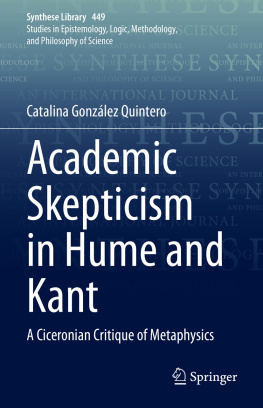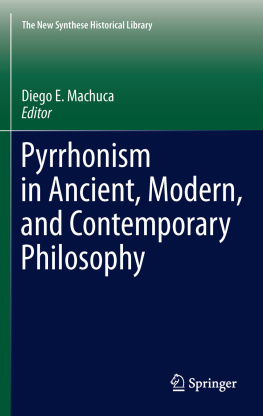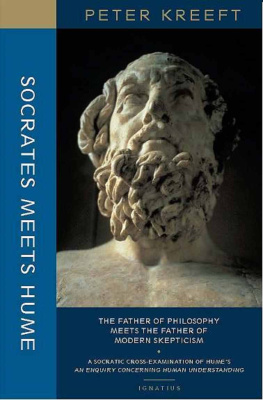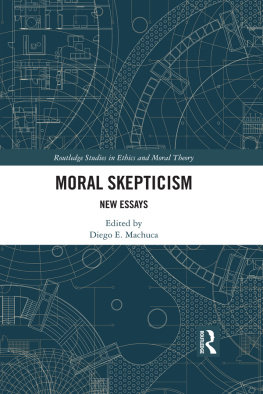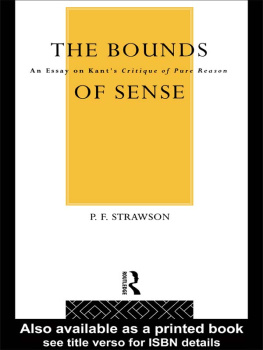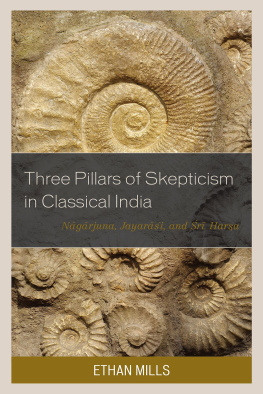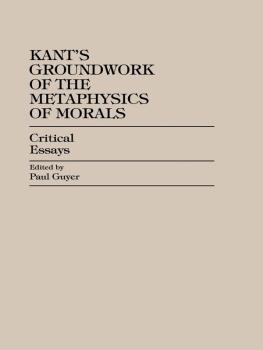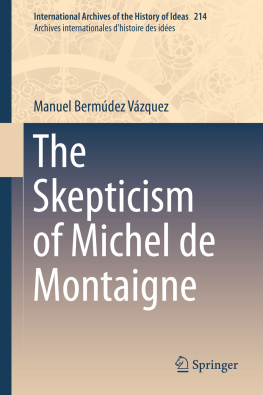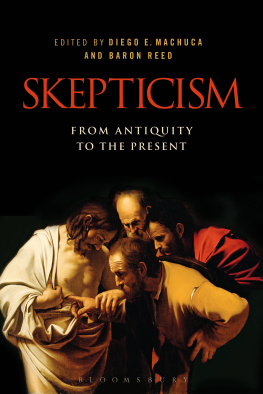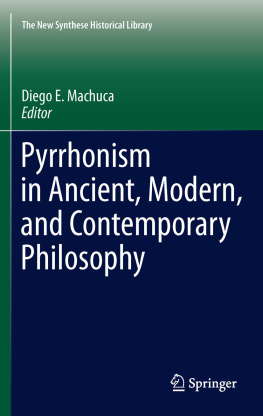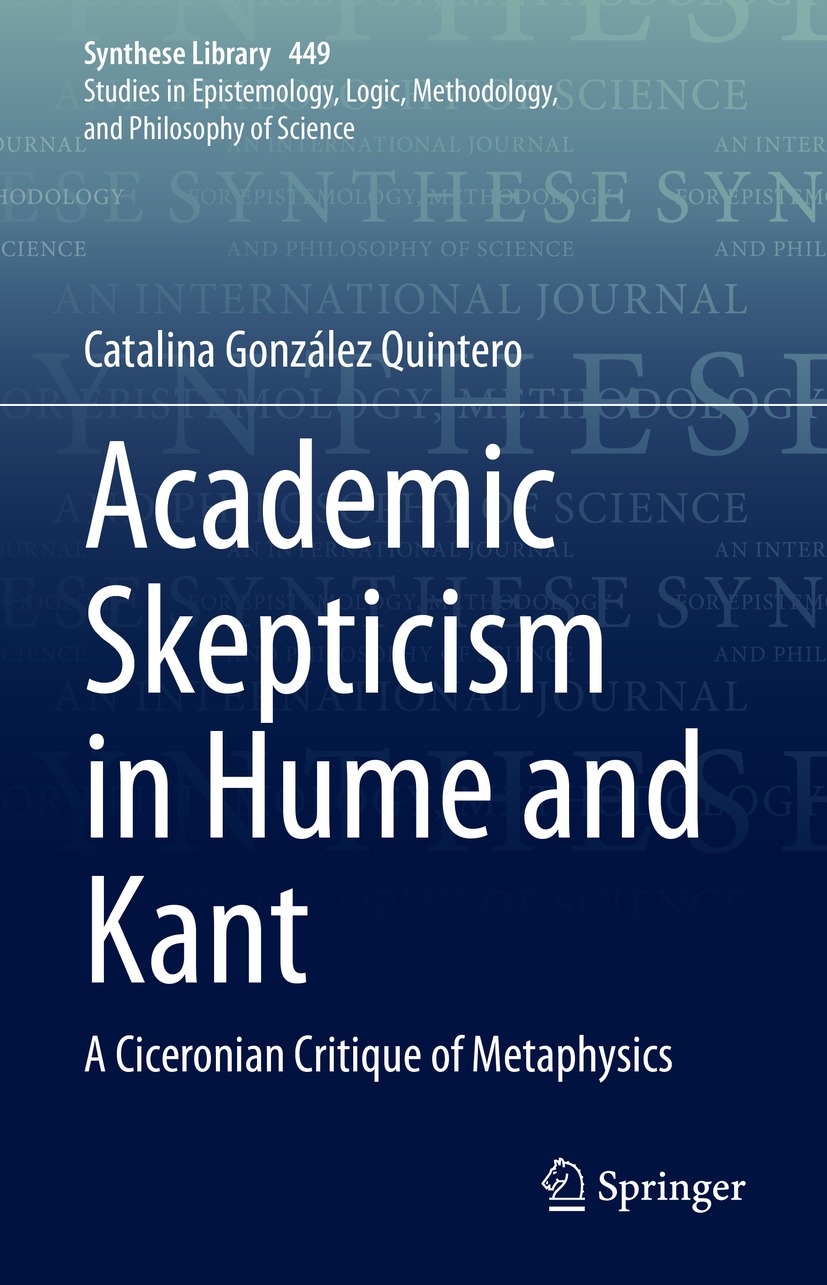Volume 449
Synthese Library Studies in Epistemology, Logic, Methodology, and Philosophy of Science
Editor-in-Chief
Otvio Bueno
Department of Philosophy, University of Miami, USA
Editorial Board
Berit Brogaard
University of Miami, USA
Anjan Chakravartty
Department of Philosophy, University of Miami, USA
Steven French
University of Leeds, UK
Catarina Dutilh Novaes
VU Amsterdam, The Netherlands
Darrell P. Rowbottom
Lingnan University, Hong Kong
Emma Ruttkamp
University of South Africa, South Africa
Kristie Miller
University of Sydney, Australia
The aim of Synthese Library is to provide a forum for the best current work in the methodology and philosophy of science and in epistemology. A wide variety of different approaches have traditionally been represented in the Library, and every effort is made to maintain this variety, not for its own sake, but because we believe that there are many fruitful and illuminating approaches to the philosophy of science and related disciplines.
Special attention is paid to methodological studies which illustrate the interplay of empirical and philosophical viewpoints and to contributions to the formal (logical, set-theoretical, mathematical, information-theoretical, decision-theoretical, etc.) methodology of empirical sciences. Likewise, the applications of logical methods to epistemology as well as philosophically and methodologically relevant studies in logic are strongly encouraged. The emphasis on logic will be tempered by interest in the psychological, historical, and sociological aspects of science.
Besides monographs Synthese Library publishes thematically unified anthologies and edited volumes with a well-defined topical focus inside the aim and scope of the book series. The contributions in the volumes are expected to be focused and structurally organized in accordance with the central theme(s), and should be tied together by an extensive editorial introduction or set of introductions if the volume is divided into parts. An extensive bibliography and index are mandatory.
More information about this series at https://link.springer.com/bookseries/6607
Catalina Gonzlez Quintero
Academic Skepticism in Hume and Kant
A Ciceronian Critique of Metaphysics

Logo of the publisher
Catalina Gonzlez Quintero
Department of Philosophy, Universidad de los Andes, Bogot, Colombia
ISSN 0166-6991 e-ISSN 2542-8292
Synthese Library
ISBN 978-3-030-89749-9 e-ISBN 978-3-030-89750-5
https://doi.org/10.1007/978-3-030-89750-5
The Editor(s) (if applicable) and The Author(s), under exclusive license to Springer Nature Switzerland AG 2022
This work is subject to copyright. All rights are solely and exclusively licensed by the Publisher, whether the whole or part of the material is concerned, specifically the rights of translation, reprinting, reuse of illustrations, recitation, broadcasting, reproduction on microfilms or in any other physical way, and transmission or information storage and retrieval, electronic adaptation, computer software, or by similar or dissimilar methodology now known or hereafter developed.
The use of general descriptive names, registered names, trademarks, service marks, etc. in this publication does not imply, even in the absence of a specific statement, that such names are exempt from the relevant protective laws and regulations and therefore free for general use.
The publisher, the authors and the editors are safe to assume that the advice and information in this book are believed to be true and accurate at the date of publication. Neither the publisher nor the authors or the editors give a warranty, expressed or implied, with respect to the material contained herein or for any errors or omissions that may have been made. The publisher remains neutral with regard to jurisdictional claims in published maps and institutional affiliations.
This Springer imprint is published by the registered company Springer Nature Switzerland AG
The registered company address is: Gewerbestrasse 11, 6330 Cham, Switzerland
To Bertha and Nono
Thesis and antithesis
About the Author
Catalina Gonzlez Quintero earned her Ph.D. in philosophy from Emory University in the USA and is currently Associate Professor of Philosophy at Universidad de los Andes in Bogot, Colombia. Her research focuses on the history of modern philosophy, particularly in the areas of skepticism and rhetoric. She has published various articles and book chapters on the philosophy of Cicero, Kant, Hume, and Vico in US, European, and Latin American journals as well as in compilations published by Springer, Palgrave, De Gruyter, SUNY Press, Lawrence Erlbaum, Universidad Nacional de Colombia, and Universidad de los Andes.
I am indeed a rash person to attempt to join issue with a pupil of the Academy who is also a trained orator!
An Academic unversed in rhetoric I should not have been much afraid of, nor yet an orator, however eloquent, who was not reinforced by that system of philosophy;for I am not disconcerted by a mere stream of empty verbiage, not yet by the subtlety of thought if it is expressed in a jejune style.
Cicero, De Natura Deorum
Acknowledgments
This book is the result of several years of research and numerous courses taught at Universidad de los Andes (Bogot, Colombia) on ancient and modern skepticism. I want to thank the University for its academic and financial support. Funding from the School of Social Sciences, in particular, enabled me to conduct research in Berlin (Germany) to gather primary and secondary sources, and to take a research leave at DePaul University (Chicago, USA), where I finished writing the manuscript in Spanish. I am grateful to Mara del Rosario Acosta and the Department of Philosophy at DePaul University for this invitation, without which my stay would not have been possible.
Many people participated in the different stages of writing this manuscript. I want to thank them all, even if I do not mention someone specifically here. I am deeply indebted to the late Rudolf Makkreel, for giving me the gift of a heterodox reading of Kant, and Steven Strange, for introducing me to Ciceros skepticism. My special thanks to Peter Cousins, who patiently prepared the translation of this book into English. I am grateful to Luis Carlos Surez for his help in searching for sources and handling the references of Kants Gesammelte Schriften; to Felipe Gonzlez for his translation of Greek and Latin terminology; to Andrea Lozano, Ignacio vila, and Mariluz Restrepo for their reading and commenting on early drafts; to Manuel Corts for his arduous work confirming bibliographical references and editing the Spanish manuscript; and to Alfonso Correa Motta for his comments on the first two chapters of the book. I cannot stress enough my gratitude to Allison Wolf for not only reading, commenting, and editing the entire book (a massive effort, indeed) but also giving me the confidence I needed to publish it in English. I am especially grateful to Lismaco Parra for giving me the courage to pursue a career in philosophy and for our long (and sometimes heated!) conversations about Kant, Hume, and religion. My friends know how much this book owes them for their constant encouragement during these years. Among them, am particularly grateful to Antonio Snchez, Marcela and Santiago Villegas, and Marcela Garca for their support at the most challenging moments of writing this manuscript. Finally, I want to thank my very dear family, my siblings Alberto and Mara Leonor, as well as their spouses and children, for their love and care. And, of course, Algaraba, for always living up to her name!

